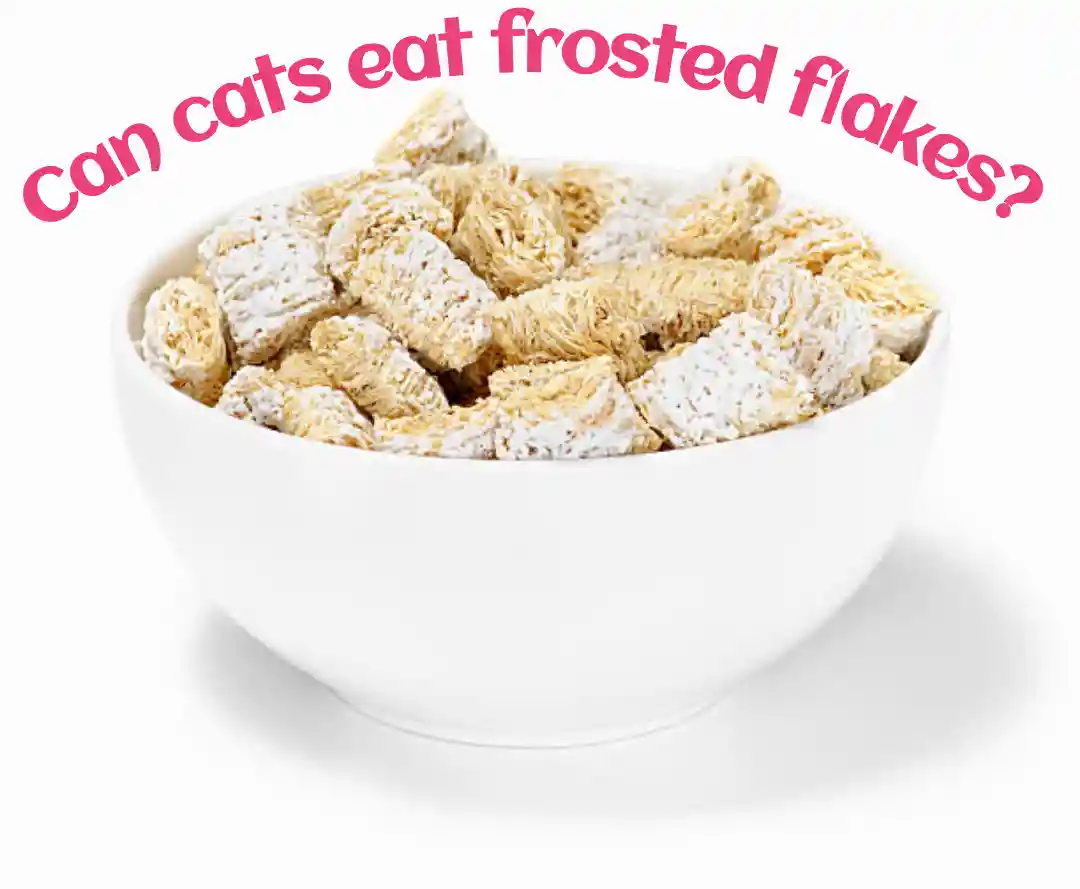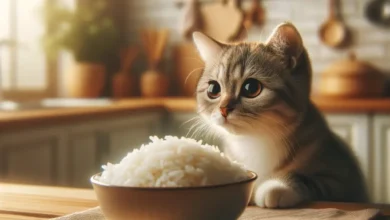Can cats eat frosted flakes? Is Frosted Flakes Safe For Cats?+ 4 Healthier Alternatives

Can cats eat frosted flakes? My house rarely runs dry of frosted flakes, as it serves as both bowls of cereal and a little crunchy snack while I’m Netflixing and chilling. Foster flakes have been formulated for human consumption and wouldn’t have the right ingredients to satisfy your cat’s nutritional needs in any way.
Cats can’t taste sugar, so any sentiment of wanting your cat to enjoy a sweet treat is struck out. Also, it doesn’t contain taurine or any cat essential nutrient instead it has a lot of sugar and artificial components, which makes it not a good long-term choice for cat treats, but can you give your cat some of these sugary cereals? Let’s find out.
Table of Contents
- What Are Frosted Flakes
- Can cats eat frosted flakes?
- Ingredients/composition of frosted flakes that may not be good for your cat
- Healthier Alternative to Frosted Flakes for Cats
- Final Thoughts
What Are Frosted Flakes
Kellogg’s rolled out Frosted Flakes in 1952 as a mainstay breakfast food that has won over many fans due to its delicious taste and texture. By taking cornflakes and coating them with sweeteners like sugar, Kellogg’s has ensured that every bowl delivers a satisfying experience no matter how often you’ve enjoyed it before.
Corn plays an important role in making this dish unique. The preparation of cornmeal involves baking the shaped flakes after an initial preparation stage.
A sweet glaze comprising sugar, corn syrup, and salt coats each flake from top to bottom resulting in a crunchy texture that sets them apart. Essential components such as natural and artificial flavorings along with vitamins and minerals round out these crunchy yet tantalizing little bites that leave people wanting more.
Can cats eat frosted flakes?
Frosted Flakes are primarily made from cornflakes that have been flavored with sugar and other additives. The sugar content in Frosted Flakes can pose multiple health risks for cats, including weight gain, obesity, and dental issues. Cats have a limited ability to process sugar, and excessive consumption of sugary treats like Frosted Flakes can increase their risk of developing diabetes.
Additionally, Frosted Flakes contain artificial flavorings and colorings that may cause allergic reactions in sensitive cats or contribute to long-term health issues. Cats are obligate carnivores, and their diet should primarily consist of animal-based protein. Frosted Flakes contain high levels of carbohydrates, which are not ideal for a feline’s diet and may lead to digestive issues or nutritional deficiencies.
While Frosted Flakes may be fortified with vitamins and minerals, these nutrients are not specifically designed for cats and may lead to over-supplementation and potential health issues. It’s always best to prioritize your cat’s well-being by choosing natural, feline-appropriate treats.
Ingredients/composition of frosted flakes that may not be good for your cat
In deciding if frosted flakes are good for your cats, we have to take a look at the ingredients used in making them, and how these ingredients may affect your cat.
I. Sugary Coating: A Possible Threat to Feline Health
A key concern with Frosted Flakes is their sugary coating, which can pose multiple health risks for cats:
- Obesity: Consuming high-sugar treats can contribute to weight gain and obesity in cats. Overweight cats are more prone to various health issues, such as diabetes, heart disease, and joint problems.
- Diabetes: Cats have a limited ability to process sugar, and excessive consumption of sugary treats like Frosted Flakes can increase their risk of developing diabetes.
- Dental health: The sugar content in Frosted Flakes may also lead to dental problems, including tooth decay and gum disease.
II. Artificial Flavorings and Colorings: Potential Risks for Cats
Frosted Flakes contain artificial flavorings and colorings, which may have potential risks for cats:
- Allergic reactions: Some cats may be sensitive to artificial ingredients, leading to allergic reactions that manifest as skin irritations, gastrointestinal issues, or respiratory problems.
- Long-term health effects: The long-term health effects of consuming artificial additives are not well understood, but it’s always better to prioritize your cat’s well-being by choosing natural, feline-appropriate treats.
- Behavioral issues: Studies have suggested links between artificial additives and behavioral issues in animals. Feeding your cat treats containing artificial ingredients may contribute to these problems.
III. High Levels of Carbohydrates: Not Ideal for Feline Diet
Cats are obligate carnivores, which means their diet should primarily consist of animal-based protein. Frosted Flakes, however, contain high levels of carbohydrates, which are not ideal for a feline’s diet:
- Inadequate nutrition: A diet high in carbohydrates and low in protein can lead to nutritional deficiencies in cats, affecting their overall health and well-being.
- Digestive issues: Cats have evolved to process a protein-rich diet, and their digestive systems are not equipped to handle high-carbohydrate diets. Feeding your cat Frosted Flakes may result in gastrointestinal issues, such as diarrhea or constipation.
IV. Fortified with Vitamins and Minerals, but not for Cats: Dangers of Over-supplementation
While Frosted Flakes may be fortified with vitamins and minerals, these nutrients are formulated for human consumption and not specifically designed for cats:
- Imbalanced nutrients: The vitamins and minerals present in Frosty Flakes may not be in the appropriate proportions for a feline diet, which can lead to imbalances and potential health issues.
- Over-supplementation: Feeding your cat Frosted Flakes may result in excessive intake of certain vitamins and minerals, which can be harmful. For instance, too much vitamin A can lead to vitamin A toxicity, causing symptoms such as bone deformities and organ damage.
Although it might be tempting to share your favorite cereal with your feline friend, it’s important to remember that the ingredients in Frosted Flakes may not be suitable for cats. Instead, opt for cat-specific treats that are designed to meet their unique nutritional needs and promote their overall health.
Healthier Alternative to Frosted Flakes for Cats
I. Freeze-Dried Protein Treats
Freeze-dried protein treats are a healthy and delicious option for cats. They are made from high-quality animal-based protein sources, such as chicken, turkey, or fish, which are essential for your cat’s overall health:
- High in protein: These treats provide the necessary animal-based protein that cats require, supporting muscle growth and maintenance.
- Low in carbohydrates: Freeze-dried protein treats are low in carbohydrates, making them a suitable option for a feline’s obligate carnivore diet.
- No artificial additives: Many freeze-dried protein treats are free from artificial additives, which can help minimize potential health risks associated with artificial ingredients.
II. Catnip
Catnip, a plant from the mint family, is a popular and natural treat option for cats. Most cats are attracted to the smell of catnip and enjoy its effects:
- Stimulating: Catnip can stimulate your cat’s senses, providing them with a fun and engaging experience.
- Stress relief: Catnip can help reduce stress and anxiety in cats, promoting relaxation and well-being.
- Easy to grow: You can easily grow catnip in your home, ensuring a continuous supply of fresh, natural treats for your feline friend.
III. Homemade Cat Treats
Making your own cat treats at home allows you to control the ingredients and ensure that they are suitable for your cat’s dietary needs:
- Tailored nutrition: You can customize homemade cat treats to include the specific nutrients your cat requires, such as animal-based protein and essential vitamins and minerals.
- Fresh ingredients: Homemade cat treats can be made with fresh, high-quality ingredients, promoting optimal health and well-being.
- No artificial additives: By making treats at home, you can avoid artificial additives and preservatives, reducing the potential risks associated with these ingredients.
IV. Dental Treats
Dental treats are specifically designed to support your cat’s oral health while providing them with a tasty snack:
- Reduce plaque and tartar: Dental treats can help reduce the build-up of plaque and tartar on your cat’s teeth, promoting overall dental health.
- Freshen breath: Some dental treats are formulated to freshen your cat’s breath, ensuring they maintain good oral hygiene.
- Support gum health: Dental treats can also help support your cat’s gum health, reducing the risk of gum disease and other oral health issues.
Final Thoughts
While cats can technically eat Frosted Flakes, it’s not recommended due to the ingredients and composition of the cereal. Opt for cat-specific treats that are designed to meet your cat’s unique nutritional needs and promote its overall health. As always, consult your veterinarian if you have any questions or concerns about your cat’s diet or health.



